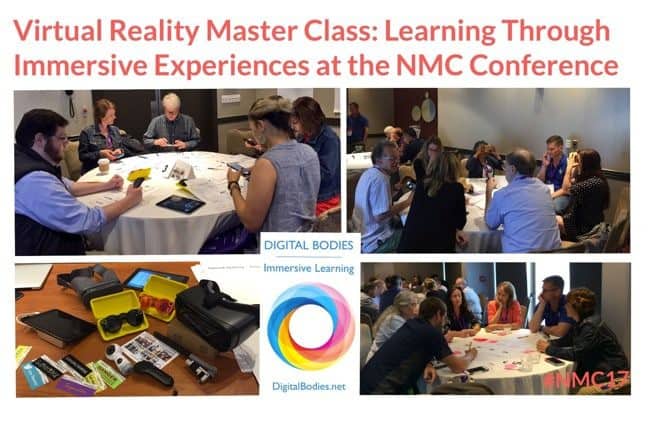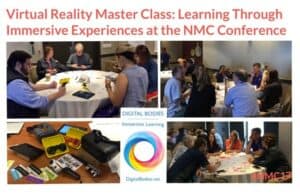At the NMC 2017 conference we led multiple sessions on Virtual Reality in education. We began the week with a pre-conference workshop, Virtual Reality Master Class: Learning Through Immersive Experiences. This is the second year in a row that we’ve offered a highly popular pre-conference session. Participants from universities across the US and international locations attended our master class workshop.
A few years back our conference workshops focused on the developments in VR and projects by vendors and research universities. Improving and making the technology affordable continues to be an important issue. But the growing familiarity with VR lets us focus on the issues of using immersive technologies in the learning environment.
Virtual Reality in Education
Our Virtual Reality Master Class included a review of current VR and AR trends and pedagogical frameworks, a VR and AR playground and a design thinking exercise. In the speed-dating activity participants explored 3D scanning, mobile VR and AR apps, 360° cameras, along with more advanced simulations and cinematic VR experiences that utilized hand controllers.
Here are some reflections from the Twitter feed by participants during our makerspace inspired workshop.
Tech speed dating with mobile scanning, 360 cameras, Google Daydream, Vear VR, Snap Spectacles, & so much more! #NMC17
–@ZachLonsinger pic.twitter.com/I3gLLtr01Y
— New Media Consortium (@NMCorg) June 13, 2017
In the second part, participants worked in teams to complete a design thinking exercise. Some groups focused on the future of storytelling in Virtual Reality while others dived into the challenges if strategic planning in curriculum development around Immersive Learning. Teams worked on immersive technology projects ranging from humanities, social work to STEM disciplines.
Virtual reality is not just another form of media, but a fundamental shift in our relationship to technology. It requires a different way of working, bringing a large set of stakeholders around the table from the very beginning. Augmented and virtual reality in education projects will benefit from an iterative process where teams focus on the learner and the story. Start by prototyping small segments and running users through parts of the VR experience early on.
The following morning, we were guests on Virtually Connecting and had the chance to reflect on the workshop.
Immersive Computing and the Future of Education
With the enthusiasm and conversations around AR and VR, we look forward to hearing more about the projects campuses will generate. VR and AR offer incredible opportunities to re-imagine learning but we cannot simply replicate our current use of technology in the learning environment. Nor should we try to do VR simply because we can. Just as film studios and news organizations have realized, virtual reality requires a new mindset.
Immersive Computing combined with AI engines will power the future of learning. We will design learning experiences that will be highly visual, social and tailored to the needs of the learner. These technologies will not only support learning in their cognitive explorations but allowed them to rapidly prototype with new digital tools and fail safely. Exploring the potential of these emerging technology with experiments on different campuses and industries will propel us forward.
It was great connecting with educators, designers, and technologists during this very hectic week of events. The NMC community embodies creativity and experimentation and we love creating a space for it to emerge.

Maya Georgieva is an EdTech and XR strategist, futurist and speaker with more than 15 years of experience in higher education and global education policy. Her most recent work focuses on innovation, VR/AR and Immersive storytelling, design and digital strategy. Maya actively writes and speaks on the topics of innovation, immersive storytelling and the future of education and consults organizations and startups in this space.

